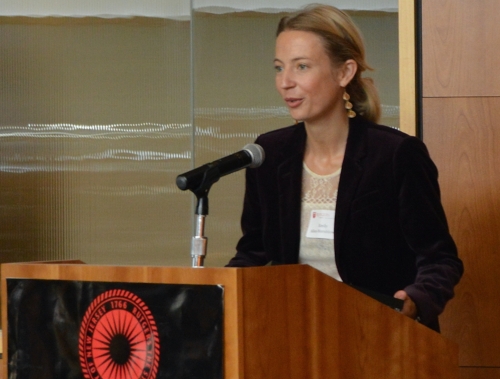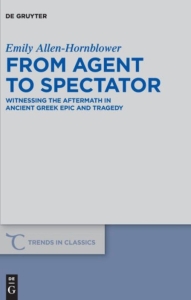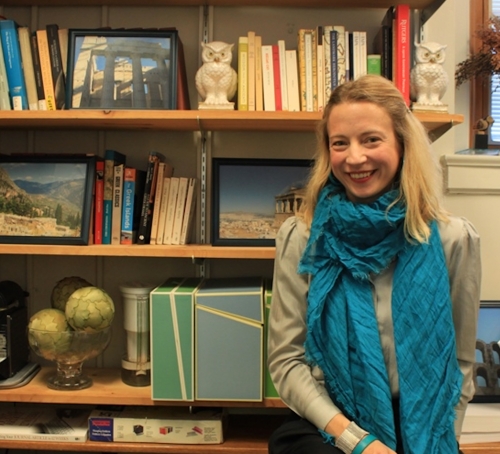The Whiting Foundation has awarded Emily Allen-Hornblower, associate professor of Classics at Rutgers-New Brunswick, one of its five Public Engagement Seed Grants for 2019-20 for a series of communal conversations, “The Public Face of Emotions: Public Engagement and the Emotions in Our Lives”.
The project aims to engage the public in discussions of ancient Greek tragedy and epic with formerly incarcerated men and women—mainly Allen-Hornblower’s former students from her teaching in NJ prisons—as an opportunity for the building of civic bridges.
The Whiting Public Engagement Seed Grants are part of the foundation’s larger Public Engagement Programs, initiated in 2016 “to celebrate and empower humanities faculty who embrace public engagement as part of the scholarly vocation”.
The Seed Grants fund public-facing humanities projects that are fully articulated but still at an early stage of development. The goal, as the Whiting Foundation underlines, is to support “ambitious, often collaborative projects” that “infuse into public life the richness, profundity, and nuance that give the humanities their lasting value”. Each Seed Grantee receives up to $10,000.
For her Whiting project, Emily Allen-Hornblower is moderating a series of public conversations—six in all—with formerly incarcerated men and women concerning ancient Greek philosophy and literature. The venues will be public libraries, universities, and other spaces, as Allen-Hornblower explains, that are “devoted to building more solidary and peaceful communities”. Each session is centered on a single emotion, such as shame, fear, or anger.
Professor Allen-Hornblower continues: “The events will begin with a brief reading from Aristotle and a short performance of an excerpt from Greek tragedy”—by professional theater actors—”to ground the moderated discussion to follow, about the role the emotions can or should play in our lives. These communal conversations will give the formerly incarcerated speakers, the actors, and the audience an opportunity to engage in a dialogue regarding the interconnectedness between all of us that storytelling and literature bring to light.”
In sum, Allen-Hornblower says “the project harnesses the power of Greek drama and epic to help us understand human emotions through storytelling. It utilizes that understanding to connect us to each other and the world around us, and to foster a sense of community and belonging for all.”
The Whiting judges in their award letter praised “the intellectual contribution and thoughtful planning of [the] project to engage multiple publics, including the recently incarcerated, in conversation.”
Emily Allen-Hornblower joined Rutgers’ Department of Classics as a tenure track assistant professor immediately after completing her PhD in Classical Philology at Harvard University, in the fall of 2009. A year later she received a second doctoral degree, under a Harvard co-tutelage agreement, from Paris IV-Sorbonne. She has been tenured at the rank of Associate Professor in Rutgers Classics since 2015.
That year Allen-Hornblower was awarded a Presidential Fellowship for Teaching Excellence—just one of five across the University. In 2016, for her innovative teaching in NJ prisons, she received an inaugural Chancellor’s Award for Faculty Excellence, that cited “her heartfelt conviction that the Classics are of significance to people in all life situations and her dedication to bringing her scholarship beyond the university classroom to new audiences”.
For her work in Greek literature, in 2012/3 and 2013/4 Allen-Hornblower received competitive research fellowships from the Center for Hellenic Studies in Washington, DC, and from the Loeb Classical Library Foundation. March 2016 saw the publication of her first book, From Agent to Spectator: Witnessing the Aftermath in Ancient Greek Epic and Tragedy, published by De Gruyter in its Trends in Classics series (see a review here).
Her areas of scholarly interest include storytelling, religion and gender, ancient cultural history, Greek and Roman epic, Greek drama (tragedy and comedy, and social justice. Her research centers on ancient (and modern) conceptions and portrayals of the human condition and suffering; interpersonal relations; and factors of connection (and disconnection) between individuals and groups.
Many congratulations, Professor Allen-Hornblower!



